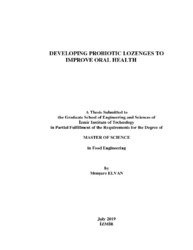Please use this identifier to cite or link to this item:
https://hdl.handle.net/11147/7385Full metadata record
| DC Field | Value | Language |
|---|---|---|
| dc.contributor.advisor | Harsa, Hayriye Şebnem | - |
| dc.contributor.advisor | Baysal, Ayşe Handan | - |
| dc.contributor.author | Elvan, Menşure | - |
| dc.date.accessioned | 2019-11-26T11:53:50Z | |
| dc.date.available | 2019-11-26T11:53:50Z | |
| dc.date.issued | 2019-07 | - |
| dc.identifier.citation | Elvan, M. (2019). Developing probiotic lozenges to improve oral health. Unpublished master's thesis, İzmir Institute of Technology, İzmir, Turkey | en_US |
| dc.identifier.uri | https://hdl.handle.net/11147/7385 | - |
| dc.description | Thesis (Master)--Izmir Institute of Technology, Food Engineering, Izmir, 2019 | en_US |
| dc.description | Includes bibliographical references (leaves: 63-84) | en_US |
| dc.description | Text in English; Abstract: Turkish and English | en_US |
| dc.description.abstract | Recently, there is a great need to overcome complaints about oral health from children, mental and physically handicapped people who are inadequate in oral hygiene and after chemotherapy of cancer patients. With reduced body resistance, opportunistic Streptococcus mutans and Candida albicans in the mouth become dominant, causing disruption of oral health. Therefore, the effect of lactic acid bacteria on pathogens was investigated in order to protect oral health with the thesis study. Lactobacillus pentosus NRRL-B 227 was determined among the probiotic bacteria tested for this purpose and its activity on the pathogen Streptoccocus mutans ATCC 25175 and Candida albicans DSMZ 5817 was found in broth microdilution, agar overlay and planktonic culture assays except disc diffusion test. To reduce the number of pathogens in oral microflora, lozenges containing L. pentosus were developed. Three different lozenges with encapsulated and free bacteria and control lozenge were produced, kept at different temperatures; 4⁰C and 25⁰C. No significant decrease in viability of the encapsulated probiotic strain after lozenge production and storage at 4°C was observed, the probiotic amount in the lozenge initially counted as 7.84 log CFU/g, while 7.73 log CFU/g at the end of 3 months shelf life. However, lozenges stored at 25⁰C probiotics lost their vitality after one month. Additionally, lozenges containing free bacteria have lost viability rapidly. Color and water activity were observed differently in the formulations (p <0.05). The formulations maintained their microbiological safety during storage. Lozenge with L. pentosus NRRL-B 227 has a significant potential for improving oral health and provides an alternative to the diversification of products containing probiotics. | en_US |
| dc.description.abstract | Son yıllarda ağız hijyenini sağlamada yetersiz kalan çocukların, zihinsel ve bedensel engelli insanların ve kanser hastalarının kemoterapi sonrası ağız sağlığı konusundaki şikayetlerinin giderilmesine önemli ölçüde ihtiyaç vardır. Azalan vücut direnci ile birlikte ağız florasında fırsatçı Streptococcus mutans ve Candida albicans hızla baskın hale gelerek ağız ve diş sağlığının bozulmasına neden olmaktadır. Bu nedenle, yapılan tez çalışması ile ağız sağlığını korumak için laktik asit bakterilerinin patojenler üzerindeki etkisi araştırılmıştır. Bu amaçla denenen probiyotik bakteriler arasından Lactobacillus pentosus NRRL-B 227’nin kullanımına karar verilmiştir ve yapılan inhibisyon metotlarından disk difüzyon testi dışında broth mikrodilüsyon, agar overlay ve planktonik kültür testi çalışmalarında patojen Streptoccocus mutans ATCC 25175 ve Candida albicans DSMZ 5817’nin üzerindeki etkinliği ortaya çıkarılmıştır. Oral mikroflorada patojen sayısını azaltmak için L. pentosus içeren fonksiyonel pastil ürünü geliştirilmiştir. Kapsüllenmiş ve kapsüllenmemiş bakteri içeren ve bakteri içermeyen üç farklı pastil üretilerek 4⁰C ve 25⁰C olmak üzere farklı sıcaklıklarda muhafaza edilmiştir. Kapsüllenmiş probiyotik suşun pastil üretiminden sonra ve 4⁰C’de depolama sırasında yaşama kabiliyetinde önemli bir düşüş gözlemlenmemiştir, başlangıçta 7.84 log CFU/g iken 3 aylık raf ömrü sonunda 7.73 log CFU/g olarak sayılmıştır. Ancak 25⁰C’de depolanan pastillerde 1 ay sonra bakteri canlılığını önemli ölçüde kaybetmiştir. Ayrıca kontrol olarak üretilen kapsüllenmemiş formda bakteri içeren pastillerde canlılık hızlı bir şekilde düşmüştür. Formülasyonlar su aktivitesi ve renk açısından farklı bulunmuştur (p <0.05). Tüm formülasyonlar depolama süresince mikrobiyolojik açıdan güvenli olarak kalmıştır. L. pentosus NRRL-B 227 suşuna sahip pastil, ağız ve diş sağlığının iyileştirilmesi açısından önemli bir potansiyele sahiptir ve probiyotik içeren ürünlerin çeşitlendirilmesine bir alternatif sunar. | en_US |
| dc.format.extent | ix, 87 leaves | - |
| dc.language.iso | en | en_US |
| dc.publisher | Izmir Institute of Technology | en_US |
| dc.rights | info:eu-repo/semantics/openAccess | en_US |
| dc.subject | Oral health | en_US |
| dc.subject | Streptococcus mutans | en_US |
| dc.subject | Candida albicans | en_US |
| dc.subject | Probiotics | en_US |
| dc.subject | Microencapsulation | en_US |
| dc.title | Developing Probiotic Lozenges To Improve Oral Health | en_US |
| dc.title.alternative | Ağız Sağlığını İyileştirmek için Probiyotik Pastil Geliştirilmesi | en_US |
| dc.type | Master Thesis | en_US |
| dc.institutionauthor | Elvan, Menşure | - |
| dc.department | Thesis (Master)--İzmir Institute of Technology, Food Engineering | en_US |
| dc.relation.publicationcategory | Tez | en_US |
| dc.identifier.wosquality | N/A | - |
| dc.identifier.scopusquality | N/A | - |
| item.openairecristype | http://purl.org/coar/resource_type/c_18cf | - |
| item.cerifentitytype | Publications | - |
| item.fulltext | With Fulltext | - |
| item.languageiso639-1 | en | - |
| item.grantfulltext | open | - |
| item.openairetype | Master Thesis | - |
| Appears in Collections: | Master Degree / Yüksek Lisans Tezleri | |
Files in This Item:
| File | Description | Size | Format | |
|---|---|---|---|---|
| T001990.pdf | MasterThesis | 1.18 MB | Adobe PDF |  View/Open |
CORE Recommender
Page view(s)
494
checked on May 5, 2025
Download(s)
956
checked on May 5, 2025
Google ScholarTM
Check
Items in GCRIS Repository are protected by copyright, with all rights reserved, unless otherwise indicated.